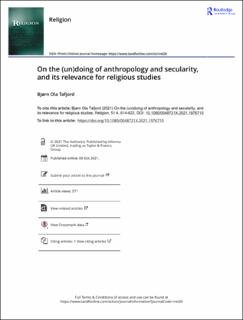On the (un)doing of anthropology and secularity, and its relevance for religious studies
Journal article, Peer reviewed
Published version

Åpne
Permanent lenke
https://hdl.handle.net/11250/2980551Utgivelsesdato
2021Metadata
Vis full innførselSamlinger
Sammendrag
This essay is a response to the inquiries and discussions of ‘anthropology’s secular conditioning’ that Khaled Furani, Joel Robbins, Jonathan Boyarin, Matthew Engelke, Richard Handler, Elayne Oliphant, and Eduardo Dullo initiate in this thematic issue of Religion. I focus on the moves that constitute anthropology and secularity. Whereas I endorse the grounded approaches that Boyarin, Engelke, Handler, Oliphant, and Dullo represent, and their highlighting of ambiguities and complexities in practices of anthropology and secularity, I am critical of Furani and Robbins’ attempt at ‘moving outside the secular condition’ by turning anthropology into an attitude in which openness to the divine appears vital. Historically, the religion/secular binary is intrinsic not only to a Christian conditioning of Western scholarship but also to political and popular practices that have materialized across the world. To me, therefore, doing religion does not seem like a credible way of undoing anthropology’s secular conditioning.
